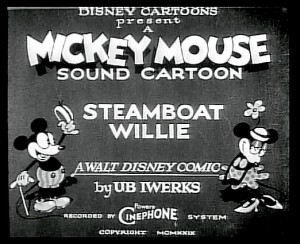 Until recently I was under the impression Mikey was still in copyright. There has been some scholarship that shows that the original copyright notice of Mickey Mouse with regards to Steam Boat Willie is defective and thus early versions of Mickey Mouse are in the public domain!
Until recently I was under the impression Mikey was still in copyright. There has been some scholarship that shows that the original copyright notice of Mickey Mouse with regards to Steam Boat Willie is defective and thus early versions of Mickey Mouse are in the public domain!
Even small flaws in formalities can equate to a lose of copyright under the 1909 act. Here is the basic argument from the LA Times:
Brown (a litigant against Disney) went searching for flawed formalities — and found one. It was on the title card at the beginning of a “Steamboat Willie” cartoon (pictured above) that had just been rereleased on a 1993 LaserDisc honoring Mickey’s 65th birthday. It said in full:
“Disney Cartoons
Present
A Mickey Mouse
Sound Cartoon
Steamboat Willie
A Walt Disney Comic
By Ub Iwerks
Recorded by Cinephone Powers System
Copyright MCMXXIX.”
The key was location of the word “copyright” in relation to the name “Walt Disney.” There were two other names listed in between — Cinephone and Disney’s top studio artist, Ub Iwerks. Arguably, any one of the three could have claimed ownership, thereby nullifying anyone’s claim under arcane rules of the Copyright Act of 1909.
Brown leapt on the ambiguity, asking the court to reconsider its ruling against him on grounds that Mickey Mouse was out of copyright. But he was too late. Without ruling on the merits of Brown’s arguments, the judge tossed it aside as untimely.
It was not the end. Debate over Mickey’s copyright status simply changed settings.
Arizona State University professor Dennis Karjala, a Brown acquaintance, suggested that one of his law school students look into the claim as a class project. Lauren Vanpelt took up the challenge and produced a paper agreeing with Brown. She posted her project on the Internet in 1999.
Here is Lauren Vanpelt’s Conclusion:
Disney first created Mickey Mouse on a sketch pad while traveling from New York to LA in 1928. Those sketches, which were protected under a common law copyright, were the basis for the Mickey Mouse motion pictures. They also provided the basis for the images printed on the Mickey Mouse Club materials sold to theaters. Disney published its common law protected expression without the proper copyright notice attached to the films and on the club materials. The statute of limitations to rectify that omission has long since elapsed, as has the statute of limitations for Disney to file any infringement claims based on that omission. As a result of its omissions and inaction, Disney forfeited its copyright claims to Mickey Mouse. Mickey has fallen into the public domain where all are free to copy and enjoy him.
I recomend readings Lauren’s full article. It makes me want to remix some Mickey Mouse music videos with CC licensed music.
Link:
Link to full LA times article


